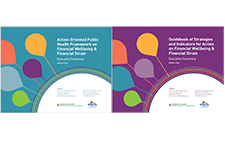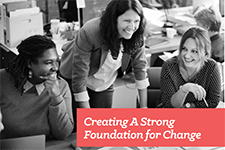Discover financial empowerment resources
Discover financial empowerment resources
Financial empowerment (FE) is an approach to poverty reduction that focuses on improving the financial security of people living on low income. Evidence shows that embedding FE interventions into municipal welfare, employment, housing, shelter and health services can significantly boost service...

Improving people’s financial circumstances has never been more critical. Disadvantaged population groups have experienced even higher levels of financial strain and poor financial wellbeing during the pandemic. This has negatively impacted their physical and mental health. To support efforts to...

This webinar series released by the Global Financial Literacy Excellence Center (GFLEC) features speakers from the public, private, and academic sectors. Past and upcoming webinar topics include: Navigating Retirement Security Through a Pandemic Financial Literacy and Wellness Among...

On June 30th, AFN presented an Expert Insights briefing on what it takes to center women of color in the relief, recovery, and rebuild plans for the current health and economic crisis and beyond. The speaker is Dominique Derbigny, deputy director of Closing the Women’s Wealth Gap (CWWG) and...

This guide is designed to be a resource for programs working with low income families to use when anticipating or implementing a new approach, such as coaching, to doing business. It helps you to systematically – and honestly – look at your foundational readiness for change, so that the...

The CFE Fund’s experience has shown that to best support Positive Youth Development, local programs should include financial empowerment strategies: access to, and education about, financial systems combined with opportunities and support to set goals and make good financial decisions. New focus...
This series summarizes the poverty reduction strategies now in place or in development in provinces and territories across Canada. Details were gathered from public documents made available by the profiled jurisdiction. This paper details the New Brunswick...
Financial education has become an important complement to market conduct and prudential regulation and improving individual financial behaviours a long-term policy priority in many countries. The OECD and its International Network on Financial Education (INFE) conducts research and develops tools...

According to a 2013 Federal Reserve Board Survey, technology is increasingly being used by people at all income levels to manage basic financial tasks. With the popularity of smart phones increasing the convenience and accessibility of the internet, combined with the ever increasing public access...
We deployed field researchers into communities in California, Mississippi, New York, Ohio, and Kentucky to delve into the intimate financial details of approximately 200 households. Over the course of a year, field researchers visited each family once or twice a month, logging detailed information...
This report, the third in a series about the “supervitamin” effect of improved social service outcomes when integrating financial empowerment and asset building strategies into public programs, details New York City’s efforts to increase access to safe and affordable banking...
This Report, the second in a series about the “supervitamin effect” of improved social service outcomes when integrating financial empowerment and asset building strategies into public programs, details New York City’s efforts to provide high-quality, effective financial counseling at scale...
This report, which documents how New York City introduced professional financial counseling into key City services, is the first in a series that build the case for fully integrating financial empowerment and asset building strategies into core social service delivery to achieve better outcomes,...
